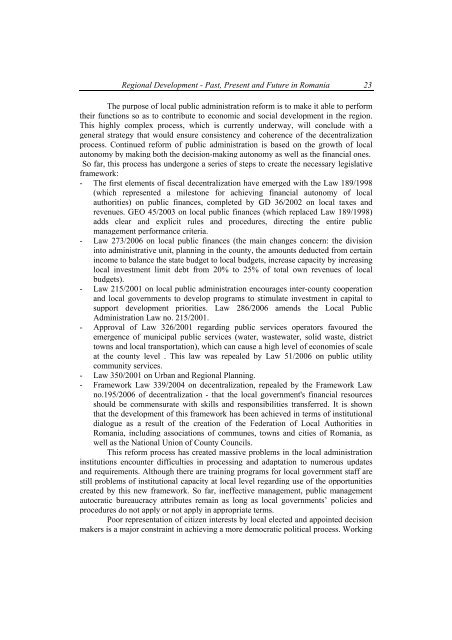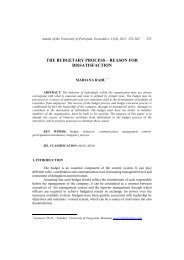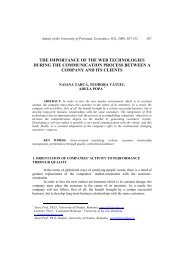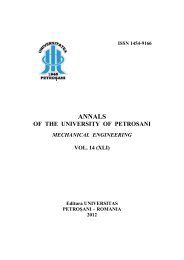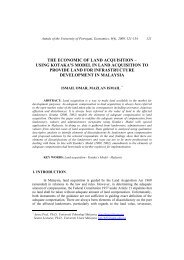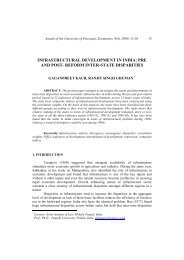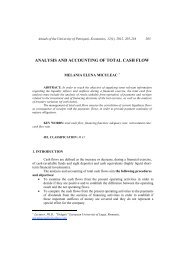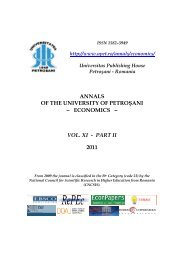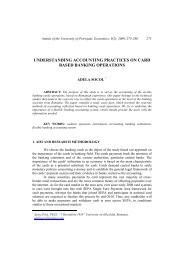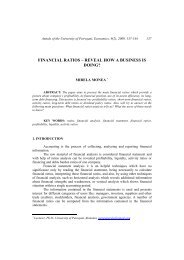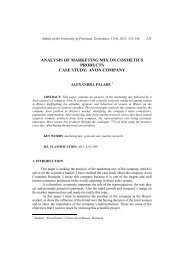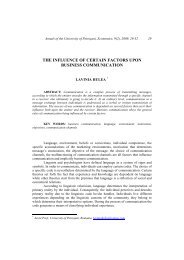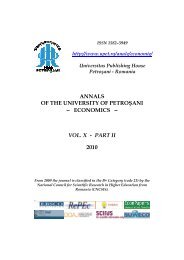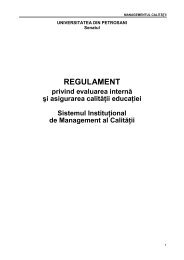annals of the university of petroÅani â¼ economics â¼ vol. xi - part i ...
annals of the university of petroÅani â¼ economics â¼ vol. xi - part i ...
annals of the university of petroÅani â¼ economics â¼ vol. xi - part i ...
Create successful ePaper yourself
Turn your PDF publications into a flip-book with our unique Google optimized e-Paper software.
Regional Development - Past, Present and Future in Romania 23<br />
The purpose <strong>of</strong> local public administration reform is to make it able to perform<br />
<strong>the</strong>ir functions so as to contribute to economic and social development in <strong>the</strong> region.<br />
This highly complex process, which is currently underway, will conclude with a<br />
general strategy that would ensure consistency and coherence <strong>of</strong> <strong>the</strong> decentralization<br />
process. Continued reform <strong>of</strong> public administration is based on <strong>the</strong> growth <strong>of</strong> local<br />
autonomy by making both <strong>the</strong> decision-making autonomy as well as <strong>the</strong> financial ones.<br />
So far, this process has undergone a series <strong>of</strong> steps to create <strong>the</strong> necessary legislative<br />
framework:<br />
- The first elements <strong>of</strong> fiscal decentralization have emerged with <strong>the</strong> Law 189/1998<br />
(which represented a milestone for achieving financial autonomy <strong>of</strong> local<br />
authorities) on public finances, completed by GD 36/2002 on local taxes and<br />
revenues. GEO 45/2003 on local public finances (which replaced Law 189/1998)<br />
adds clear and explicit rules and procedures, directing <strong>the</strong> entire public<br />
management performance criteria.<br />
- Law 273/2006 on local public finances (<strong>the</strong> main changes concern: <strong>the</strong> division<br />
into administrative unit, planning in <strong>the</strong> county, <strong>the</strong> amounts deducted from certain<br />
income to balance <strong>the</strong> state budget to local budgets, increase capacity by increasing<br />
local investment limit debt from 20% to 25% <strong>of</strong> total own revenues <strong>of</strong> local<br />
budgets).<br />
- Law 215/2001 on local public administration encourages inter-county cooperation<br />
and local governments to develop programs to stimulate investment in capital to<br />
support development priorities. Law 286/2006 amends <strong>the</strong> Local Public<br />
Administration Law no. 215/2001.<br />
- Approval <strong>of</strong> Law 326/2001 regarding public services operators favoured <strong>the</strong><br />
emergence <strong>of</strong> municipal public services (water, wastewater, solid waste, district<br />
towns and local transportation), which can cause a high level <strong>of</strong> economies <strong>of</strong> scale<br />
at <strong>the</strong> county level . This law was repealed by Law 51/2006 on public utility<br />
community services.<br />
- Law 350/2001 on Urban and Regional Planning.<br />
- Framework Law 339/2004 on decentralization, repealed by <strong>the</strong> Framework Law<br />
no.195/2006 <strong>of</strong> decentralization - that <strong>the</strong> local government's financial resources<br />
should be commensurate with skills and responsibilities transferred. It is shown<br />
that <strong>the</strong> development <strong>of</strong> this framework has been achieved in terms <strong>of</strong> institutional<br />
dialogue as a result <strong>of</strong> <strong>the</strong> creation <strong>of</strong> <strong>the</strong> Federation <strong>of</strong> Local Authorities in<br />
Romania, including associations <strong>of</strong> communes, towns and cities <strong>of</strong> Romania, as<br />
well as <strong>the</strong> National Union <strong>of</strong> County Councils.<br />
This reform process has created massive problems in <strong>the</strong> local administration<br />
institutions encounter difficulties in processing and adaptation to numerous updates<br />
and requirements. Although <strong>the</strong>re are training programs for local government staff are<br />
still problems <strong>of</strong> institutional capacity at local level regarding use <strong>of</strong> <strong>the</strong> opportunities<br />
created by this new framework. So far, ineffective management, public management<br />
autocratic bureaucracy attributes remain as long as local governments’ policies and<br />
procedures do not apply or not apply in appropriate terms.<br />
Poor representation <strong>of</strong> citizen interests by local elected and appointed decision<br />
makers is a major constraint in achieving a more democratic political process. Working


